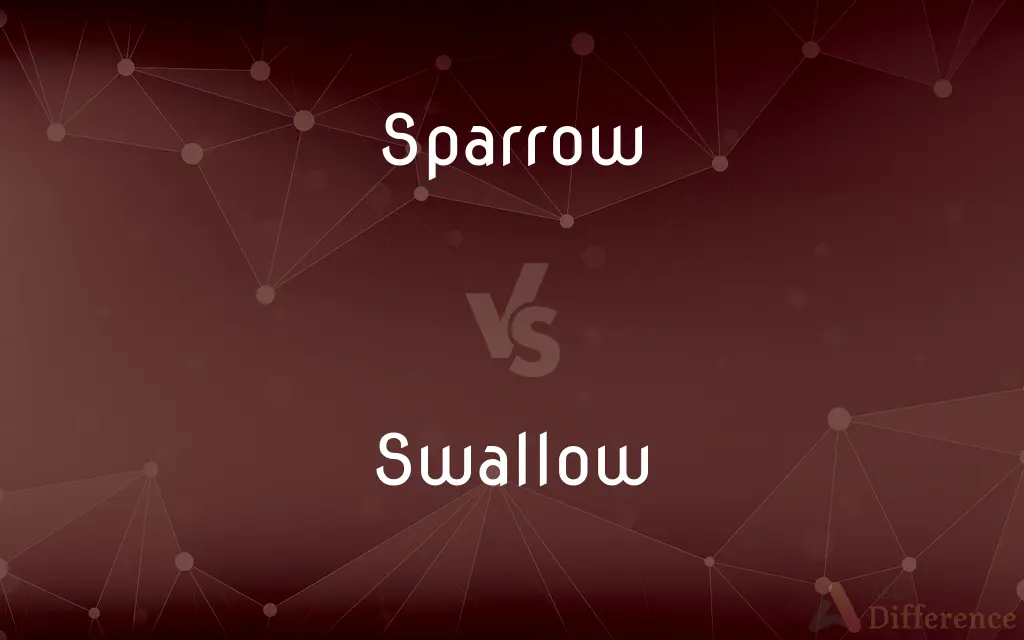Sparrow vs. Swallow — What's the Difference?
By Tayyaba Rehman & Urooj Arif — Updated on March 19, 2024
Sparrows are small, plump birds known for their seed-eating habits, whereas swallows are sleek, agile birds, recognized for catching insects in flight.

Difference Between Sparrow and Swallow
Table of Contents
ADVERTISEMENT
Key Differences
Sparrows are often found in urban and rural settings, adapting well to human environments, where they primarily feed on seeds and small insects. Whereas swallows are more commonly seen in open areas or near water, capturing insects mid-air with their acrobatic flight.
Sparrows have a robust and rounded appearance, with stout beaks adapted for seed eating. On the other hand, swallows exhibit a streamlined body with long, pointed wings and a forked tail, optimizing their flight for insect hunting.
The social behavior of sparrows includes forming large flocks, especially in non-breeding seasons, providing safety in numbers. Swallows, while also social, are known for their migratory habits, traveling long distances in groups from breeding to wintering grounds.
Sparrows’ nests are typically messy and made of grass, feathers, and trash, found in trees, buildings, or bushes. In contrast, swallows often build their nests out of mud in the form of cups, attached to structures under eaves or on cliffs.
The vocalizations of sparrows consist of a variety of chirps and calls, used for communication within flocks and during courtship. Swallows, however, are known for their twittering and chattering sounds, especially during flight.
ADVERTISEMENT
Comparison Chart
Habitat
Urban and rural, near human settlements
Open areas, near water
Diet
Seeds and small insects
Insects caught in flight
Appearance
Plump, stout beak
Sleek, long wings, forked tail
Behavior
Forms large flocks
Migratory, travels in groups
Nesting
Messy, in trees or buildings
Mud cups, under eaves or on cliffs
Compare with Definitions
Sparrow
Varied chirps for communication.
The morning was filled with the chirps of sparrows.
Swallow
Insectivorous bird with agile flight.
The swallow darted through the air, catching insects.
Sparrow
Adaptable to urban environments.
Sparrows are commonly seen in city parks and gardens.
Swallow
Streamlined body for flight.
The swallow's sleek shape is perfect for aerial maneuvers.
Sparrow
Small bird known for seed eating.
The sparrow pecked at seeds scattered on the ground.
Swallow
Nests made of mud in cup shapes.
The swallow’s mud nest was attached under the eave.
Sparrow
Messy nests of grass and trash.
Sparrows built a nest in the old mailbox.
Swallow
Known for twittering sounds.
The sky was alive with the twittering of swallows.
Sparrow
Social, forming large flocks.
A flock of sparrows descended on the feeder.
Swallow
Migratory, traveling long distances.
Swallows migrate south for the winter.
Sparrow
Any of various small birds of the family Emberizidae, having brownish or grayish plumage and found throughout the Americas, such as the song sparrow.
Swallow
The swallows, martins, and saw-wings, or Hirundinidae, are a family of passerine birds found around the world on all continents, including occasionally in Antarctica. Highly adapted to aerial feeding, they have a distinctive appearance.
Sparrow
Any of various birds of the family Passeridae, especially the house sparrow.
Swallow
To cause (food or drink, for example) to pass through the mouth and throat into the stomach.
Sparrow
Any of various similar birds of other families, such as the Java sparrow.
Swallow
To put up with (something unpleasant)
Swallowed the insults and kept on working.
Sparrow
The house sparrow, Passer domesticus; a small bird with a short bill, and brown, white and gray feathers.
Swallow
To refrain from expressing; suppress
Swallow one's feelings.
Sparrow
A member of the family Passeridae, comprising small Old World songbirds.
Swallow
To envelop or engulf
A building that was swallowed up by fire.
Sparrow
A member of the family Emberizidae, comprising small New World songbirds.
Swallow
To consume or use up
Relief money that was swallowed by administrative costs.
Sparrow
Generically, any small, nondescript bird.
Swallow
(Slang) To believe without question
Swallowed the alibi.
Sparrow
A quick-witted, lively person.
Cockney sparrow
Swallow
To take back; retract
Swallow one's words.
Sparrow
One of many species of small singing birds of the family Fringilligæ, having conical bills, and feeding chiefly on seeds. Many sparrows are called also finches, and buntings. The common sparrow, or house sparrow, of Europe (Passer domesticus) is noted for its familiarity, its voracity, its attachment to its young, and its fecundity. See House sparrow, under House.
Swallow
To say inarticulately; mumble
The actor swallowed his lines.
Sparrow
Any one of several small singing birds somewhat resembling the true sparrows in form or habits, as the European hedge sparrow. See under Hedge.
He that doth the ravens feed,Yea, providently caters for the sparrow,Be comfort to my age!
Swallow
To perform the act of swallowing.
Sparrow
Any of several small dull-colored singing birds feeding on seeds or insects
Swallow
The act of swallowing.
Sparrow
Small brownish European songbird
Swallow
An amount swallowed.
Swallow
(Nautical) The channel through which a rope runs in a block or a mooring chock.
Swallow
Any of various small graceful swift-flying passerine birds of the family Hirundinidae, having long pointed wings, a usually notched or forked tail, and a large mouth for catching flying insects.
Swallow
Any of various similar birds, such as a swift.
Swallow
(transitive) To cause (food, drink etc.) to pass from the mouth into the stomach; to take into the stomach through the throat.
Swallow
(transitive) To take (something) in so that it disappears; to consume, absorb.
Swallow
(intransitive) To take food down into the stomach; to make the muscular contractions of the oesophagus to achieve this, often taken as a sign of nervousness or strong emotion.
My throat was so sore that I was unable to swallow.
Swallow
(transitive) To accept easily or without questions; to believe, accept.
Swallow
(intransitive) To engross; to appropriate; usually with up.
Swallow
(transitive) To retract; to recant.
To swallow one's opinions
Swallow
(transitive) To put up with; to bear patiently or without retaliation.
To swallow an affront or insult
Swallow
(archaic) A deep chasm or abyss in the earth.
Swallow
(archaic) The mouth and throat; that which is used for swallowing; the gullet.
Swallow
The amount swallowed in one gulp; the act of swallowing.
He took the aspirin with a single swallow of water.
Swallow
(nautical) The opening in a pulley block between the sheave and shell through which the rope passes.
Swallow
(Nigeria) Any of various carbohydrate-based dishes that are swallowed without much chewing.
Swallow
A small, migratory bird of the Hirundinidae family with long, pointed, moon-shaped wings and a forked tail which feeds on the wing by catching insects.
Swallow
Any one of numerous species of passerine birds of the family Hirundinidæ, especially one of those species in which the tail is deeply forked. They have long, pointed wings, and are noted for the swiftness and gracefulness of their flight.
Swallow
Any one of numerous species of swifts which resemble the true swallows in form and habits, as the common American chimney swallow, or swift.
Swallow
The aperture in a block through which the rope reeves.
Swallow
The act of swallowing.
Swallow
The gullet, or esophagus; the throat.
Swallow
Taste; relish; inclination; liking.
I have no swallow for it.
Swallow
Capacity for swallowing; voracity.
There being nothing too gross for the swallow of political rancor.
Swallow
As much as is, or can be, swallowed at once; as, a swallow of water.
Swallow
That which ingulfs; a whirlpool.
Swallow
To take into the stomach; to receive through the gullet, or esophagus, into the stomach; as, to swallow food or drink.
As if I had swallowed snowballs for pills.
Swallow
To draw into an abyss or gulf; to ingulf; to absorb - usually followed by up.
The earth opened her mouth, and swallowed them up, and their houses.
Swallow
To receive or embrace, as opinions or belief, without examination or scruple; to receive implicitly.
Though that story . . . be not so readily swallowed.
Swallow
To engross; to appropriate; - usually with up.
Homer excels . . . in this, that he swallowed up the honor of those who succeeded him.
Swallow
To occupy; to take up; to employ.
The necessary provision of the life swallows the greatest part of their time.
Swallow
To seize and waste; to exhaust; to consume.
Corruption swallowed what the liberal handOf bounty scattered.
Swallow
To retract; to recant; as, to swallow one's opinions.
Swallow
To put up with; to bear patiently or without retaliation; as, to swallow an affront or insult.
Swallow
To perform the act of swallowing; as, his cold is so severe he is unable to swallow.
Swallow
A small amount of liquid food;
A sup of ale
Swallow
The act of swallowing;
One swallow of the liquid was enough
He took a drink of his beer and smacked his lips
Swallow
Small long-winged songbird noted for swift graceful flight and the regularity of its migrations
Swallow
Pass through the esophagus as part of eating or drinking;
Swallow the raw fish--it won't kill you!
Swallow
Engulf and destroy;
The Nazis swallowed the Baltic countries
Swallow
Enclose or envelop completely, as if by swallowing;
The huge waves swallowed the small boat and it sank shortly thereafter
Swallow
Utter indistinctly;
She swallowed the last words of her speech
Swallow
Take back what one has said;
He swallowed his words
Swallow
Keep from expressing;
I swallowed my anger and kept quiet
Swallow
Tolerate or accommodate oneself to;
I shall have to accept these unpleasant working conditions
I swallowed the insult
She has learned to live with her husband's little idiosyncracies
Swallow
Believe or accept without questioning or challenge;
Am I supposed to swallow that story?
Common Curiosities
Which bird is known for forming large flocks?
Sparrows are known for forming large flocks.
How do the nesting habits of sparrows and swallows differ?
Sparrows make messy nests in trees or buildings, while swallows build mud cup nests under eaves or on cliffs.
What type of sounds do sparrows make compared to swallows?
Sparrows make chirps and calls, whereas swallows are known for their twittering.
Are sparrows or swallows more adapted to urban environments?
Sparrows are more adapted to urban environments.
What primarily differentiates a sparrow's diet from a swallow's?
Sparrows primarily eat seeds, while swallows catch insects in flight.
What is unique about a swallow's flight?
Swallows have agile and acrobatic flight, optimized for catching insects.
What time of year do swallows migrate?
Swallows migrate during spring and autumn, depending on their location.
Which bird has a more robust and rounded appearance?
Sparrows have a more robust and rounded appearance.
Can sparrows and swallows be found in the same environment?
While they may share some environments, they typically prefer different habitats.
Do sparrows eat insects?
Yes, sparrows eat small insects in addition to seeds.
What is the typical habitat of a sparrow?
Sparrows typically inhabit urban and rural areas near human settlements.
Why do swallows build their nests out of mud?
Swallows use mud to build their nests because it's a durable and readily available material.
Are swallows migratory?
Yes, swallows are migratory birds.
Do both sparrows and swallows live in flocks?
Sparrows form large flocks, especially in non-breeding seasons, while swallows travel in groups during migration.
How do sparrows communicate?
Sparrows communicate using a variety of chirps and calls.
Share Your Discovery

Previous Comparison
Synchondrosis vs. Symphysis
Next Comparison
County vs. MunicipalityAuthor Spotlight
Written by
Tayyaba RehmanTayyaba Rehman is a distinguished writer, currently serving as a primary contributor to askdifference.com. As a researcher in semantics and etymology, Tayyaba's passion for the complexity of languages and their distinctions has found a perfect home on the platform. Tayyaba delves into the intricacies of language, distinguishing between commonly confused words and phrases, thereby providing clarity for readers worldwide.
Co-written by
Urooj ArifUrooj is a skilled content writer at Ask Difference, known for her exceptional ability to simplify complex topics into engaging and informative content. With a passion for research and a flair for clear, concise writing, she consistently delivers articles that resonate with our diverse audience.
















































